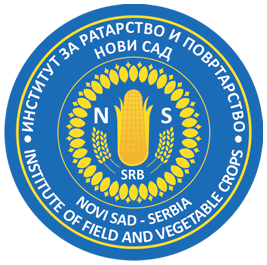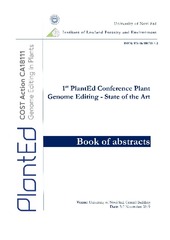Приказ основних података о документу
Exploitation of genetic resources in breeding of Brassica species
| dc.creator | Marjanović-Jeromela, Ana | |
| dc.creator | Miladinović, Dragana | |
| dc.creator | Balalić, Igor | |
| dc.creator | Cvejić, Sandra | |
| dc.creator | Grahovac, Nada | |
| dc.creator | Jocković, Milan | |
| dc.creator | Kiprovski, Biljana | |
| dc.creator | Ovuka, Jelena | |
| dc.creator | Radanović, Aleksandra | |
| dc.creator | Rajković, Dragana | |
| dc.creator | Terzić, Sreten | |
| dc.creator | Kondić-Špika, Ankica | |
| dc.date.accessioned | 2021-07-22T12:50:46Z | |
| dc.date.available | 2021-07-22T12:50:46Z | |
| dc.date.issued | 2019 | |
| dc.identifier.isbn | 978-86-900741-1-2 | |
| dc.identifier.uri | http://fiver.ifvcns.rs/handle/123456789/2200 | |
| dc.description.abstract | The Brassicaceae family (Cruciferae Juss.) is one of the 10 most economically important plant families. The most prominent members are Brassica napus L., with globally widespread cultivars with low-erucic acid content, known as canola, and several types of mustard (Brassica spp. and Sinapis spp.). IFVCNS is the only research institute in Serbia dealing with the cultivation of oil crops from the Brassicaceae family. The breeding of Brassica species from the collection resulted in the introduction and spread of black and white mustards and false flax (Camelina sativa (L.) Crantz) cultivation areas. These species are rarely grown and used in Serbia. Rapesced collection consists of 11 cultivars and 20 lines of spring rapeseed, as well as 56 cultivars and 980 lines of winter rapeseed. AILIFVCNS genotypes are phenotypically and cytogenetically characterized, with specific regard to their phenology, morphology of the flowers, pollen characteristics and the number of chromosomes, resistance / sensitivity to diseases and pests, as well as seed quality (oil, protein content, fatty acid and composition tocopherol). Significant genetic variations were found. Because commercial rapeseed breeders are directly engaged in the assessment and selection of the material, the collection is a valuable resource for a mote detailed characterization of other traits important for breeding. The constant and systematic use of this collection with the application of conventional breeding methods, combined with various modern molecular techniques, is an effective tool in the development of IFVCNS cultivars and hybrids adapted to changing environmental conditions and market requirements. The novel gene editing instruments can enhance exploitation of genetic resources in the development of productive genotypes as renewable raw materials to produce food and non-food oils, particularly in low-input systems and marginal soils suitable for conventional and organic farming systems. | sr |
| dc.language.iso | en | sr |
| dc.publisher | Novi Sad : University Novi Sad, Institute of Lowland Forestry and Environment | sr |
| dc.relation | info:eu-repo/grantAgreement/MESTD/Technological Development (TD or TR)/31025/RS// | sr |
| dc.relation | COST Action CA18111: Genome editing in plants - a technology with transformative potential | sr |
| dc.rights | openAccess | sr |
| dc.rights.uri | https://creativecommons.org/licenses/by/4.0/ | |
| dc.source | Book of Abstracts, PlantEd COST Action CA18111 Genome Editing in Plants: 1st PlantEd conference Plant Genome Editing – State of the Art, 5-7.11.2019., Novi Sad, Serbia | sr |
| dc.subject | Brassica species | sr |
| dc.subject | breeding | sr |
| dc.subject | IFVCNS | sr |
| dc.subject | gene editing | sr |
| dc.subject | rapeseed collection | sr |
| dc.subject | genetic variations | sr |
| dc.title | Exploitation of genetic resources in breeding of Brassica species | sr |
| dc.type | conferenceObject | sr |
| dc.rights.license | BY | sr |
| dc.citation.epage | 39 | |
| dc.citation.spage | 39 | |
| dc.identifier.fulltext | http://fiver.ifvcns.rs/bitstream/id/5906/bitstream_5906.pdf | |
| dc.identifier.rcub | https://hdl.handle.net/21.15107/rcub_fiver_2200 | |
| dc.type.version | publishedVersion | sr |


